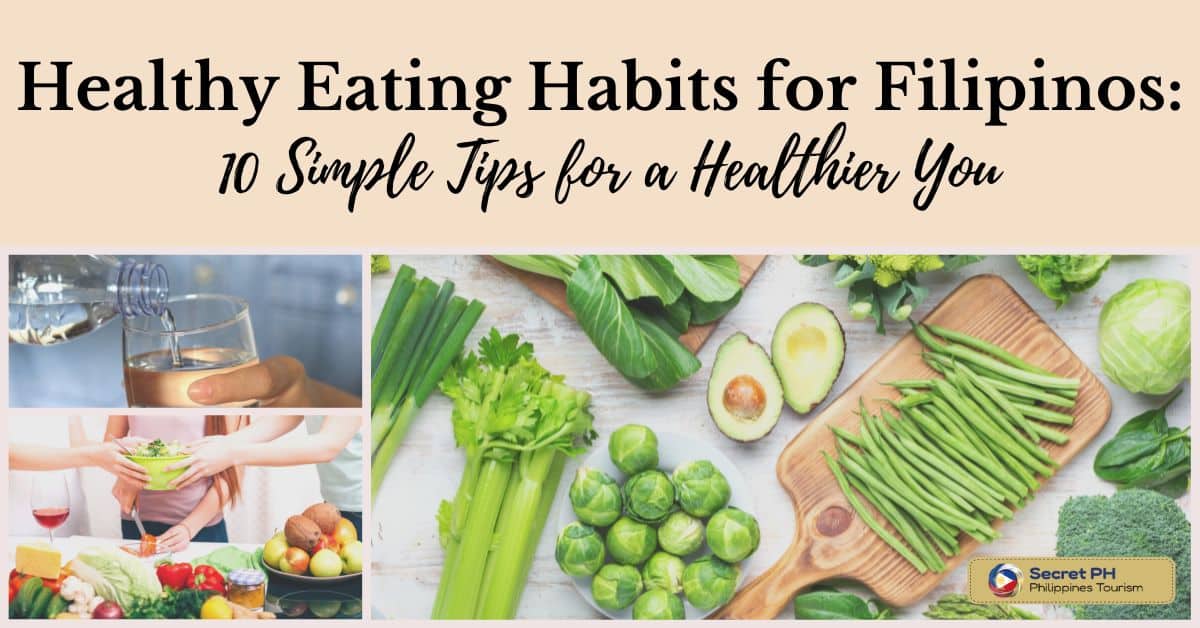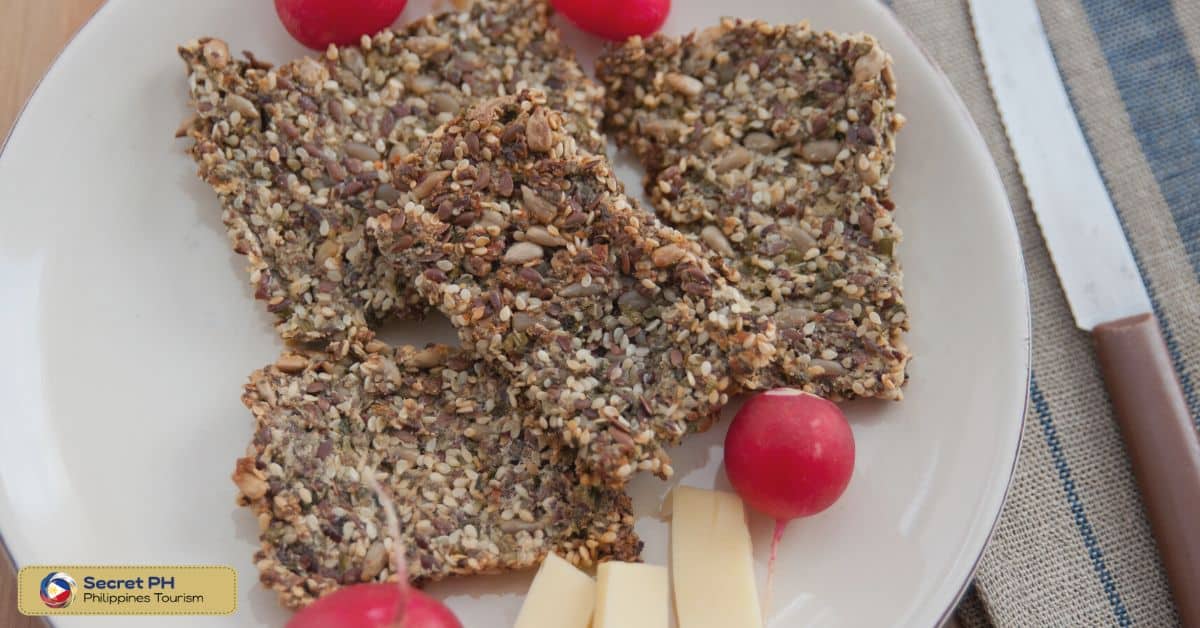Good nutrition is a fundamental component of good health and well-being, with healthy eating habits playing an important role in maintaining this. Eating well can help us to stay physically active, reduce the risk of numerous diseases, and even improve our moods.
In the Philippines, where many people have adopted a diet that is high in processed foods and sugar-laden snacks and drinks, it is important to be mindful of what we are consuming and to strive for healthier eating habits.
Here are 10 simple tips for Filipino households to help promote healthy eating habits. With these guidelines, you can enjoy tasty meals while taking care of your health.

Tip 1: Incorporate More Fruits and Vegetables into Your Diet
Incorporating more fresh fruits and vegetables into your diet can significantly benefit your health in a variety of ways. Eating plenty of fruits and vegetables can reduce the risk of heart disease, high blood pressure, obesity, type 2 diabetes, bone loss, certain types of cancer, digestive disorders, and more.
A great way to incorporate these foods into your diet is by experimenting with different recipes that contain items like avocado, kale, spinach, apples, oranges, pears, squash, sweet potatoes, and tomatoes.
If you are looking for an easy way to increase the number of fruits and vegetables in your daily meals or snacks start off simply by adding them as a side to a protein-based dish or having it as a snack such as apple slices with peanut butter. There are many possible variations when adding fruits and vegetables to your diet so have fun while exploring all that they have to offer!

Tip 2: Choose Whole Grains Over Refined Grains
When it comes to selecting grains, the right choice is essential for maintaining a healthy diet. Whenever possible, choosing whole grains over refined grains can make a big difference in your overall health and well-being.
Whole grain starches are a valuable source of dietary fiber and nutrients that support heart health, provide vitamins and minerals, and also help with digestion. Some popular examples of whole grain products include oats, brown rice, quinoa, buckwheat, millet, bulgur wheat, spelt, farro, freekeh, and kamut.
Some up-and-coming small grains currently trending are teff and barley. Making the switch to whole grains allows you to receive all of the nutritional benefits packed inside each kernel rather than losing out on important nutrients during the refining process. With countless options available it’s easier than ever to find a tasty whole grain that fits into any meal plan.

Tip 3: Limit Your Intake of Processed Foods
Limiting the number of processed foods you eat is a great way to maintain your health and well-being. Processed foods often contain added sugars, unhealthy fats, sodium, and other additives that can be detrimental to our overall health when consumed in large amounts.
Sticking with whole, minimally processed foods like fresh fruits and vegetables, whole grains, lean proteins, nuts, and seeds can go a long way in providing essential nutrients to the body while avoiding potential health risks from unhealthy additives.
Making small changes like reading food labels carefully and choosing whole foods over processed ones whenever possible are simple steps that everyone can take to enjoy delicious meals while taking care of their health.

Tip 4: Drink Plenty of Water
Staying hydrated is essential for proper bodily function and it can also help us to stay physically active, reduce fatigue, and maintain a healthy weight.
Drinking enough water throughout the day can promote better digestion and improve the absorption of nutrients from food, as well as regulate body temperature, lubricate joints, prevent dehydration, and even reduce the risk of kidney stones.
Staying hydrated is easy with plenty of water available to drink, including filtered tap water, spring water, or mineral water. For those who don’t like the taste of plain water, adding a slice of lemon or lime can provide some added flavor without the added calories.

Tip 5: Get Enough Sleep
Getting enough sleep is another essential factor for our overall health and well-being. Most adults should aim for 7 to 9 hours of sleep every night as this helps us to feel refreshed and energized during the day.
Having regular, quality sleep each night can help regulate our hormones, improve our moods, increase energy levels, and optimize cognitive function. Those who get inadequate amounts of sleep are at higher risk for various chronic diseases and mental health disorders.
Creating a nighttime routine with consistent bedtimes can help us to reset our natural body clocks and ensure we are getting the restful sleep that our bodies need to function properly.

Tip 6: Reduce Your Sugar Intake
High sugar intake can contribute to weight gain, obesity, and an increased risk for chronic conditions such as type 2 diabetes, heart disease, and certain types of cancer.
Limiting your intake of sugary foods like candy, soda, sugary coffee drinks, and sweetened juices is a great way to reduce your overall sugar consumption.
Swapping out these unhealthy items for healthier options such as naturally sweet fruits and vegetables can provide your body with essential vitamins and minerals while helping you to manage your weight.

Tip 7: Choose Healthy Fats and Oils
Healthy fats and oils are an important part of any healthy diet. They provide us with essential fatty acids that our bodies need for proper functioning as well as energy to keep us going throughout the day.
Including healthy sources of fat in meals such as olive oil, avocados, nuts, and seeds can help to reduce the risk for heart disease, improve blood sugar control, and even aid with weight loss.
It’s important to note that not all fats are created equal so be sure to choose healthy sources such as monounsaturated and polyunsaturated fats over trans fats or saturated fats whenever possible.

Tip 8: Prepare Your Meals at Home
Preparing meals at home can be a great way to maintain a healthy diet. Cooking your own food is an excellent way to control the ingredients you are using, such as lowering the amount of salt or sugar you add and opting for healthier cooking methods like grilling, steaming, roasting, or poaching instead of deep-frying.
Planning meals ahead of time and taking the time to cook can also help you save money in the long run. This can be especially beneficial for those who may not have access to healthy, affordable food options when eating out.

Tip 9: Read Labels Carefully When Buying Groceries
Reading food labels can help you make healthier choices when buying groceries. Pay attention to the serving size, calories, fat, sodium, sugar, and fiber content of food items.
Choose foods with lower amounts of added sugar and saturated fat. Look for lean proteins like fish, chicken, or beans instead of red meat. Don’t forget to check the label on packaged goods like crackers, cookies, and cereals for added sugar.

Tip 10: Eat Slowly and Mindfully
Eating slowly and mindfully can help us to savor each bite of our food while making sure we are eating enough to feel satisfied. Eating quickly can lead to overeating as it takes time for the brain to realize that the stomach is full.
Mindful eating helps us become aware of every sensation that comes with eating such as taste, texture, and smell. Taking the time to enjoy each bite allows us to really appreciate our food and better recognize when we’ve had enough.
In addition, chewing your food slowly and thoroughly can help with proper digestion as it gives your body more time to break down the proteins, carbohydrates, and fats that you are consuming.

In Conclusion
Establishing healthy eating habits is essential for maintaining good health and well-being. By following the 10 simple tips above, you can enjoy delicious meals while taking care of your physical and mental health.
Through mindful eating, increasing water intake, consuming plenty of fruits and vegetables, and preparing meals at home, we can make sure that our bodies are receiving the nutrients they need to stay healthy. With effort and consistent practice of these tips, Filipinos can achieve a healthier lifestyle. Best of luck on your journey to health!








